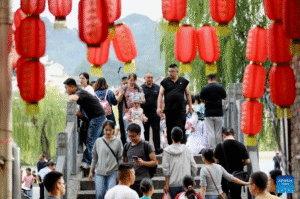Tokyo Olympics open amid pandemic restrictions

Ayano Shimizu / Kyodo News —–
After postponement and seemingly endless problems, the Tokyo Olympic cauldron was finally lit Friday night ( July 23 ) in a nearly empty National Stadium, marking the start of a games being held amid unprecedented challenges posed by the coronavirus pandemic and with public opinion still split.
The opening ceremony raised the curtain on the largest multinational event to take place since the virus took hold early last year and following a one-year delay. Involving about 11,000 athletes from over 200 countries and regions, venues will be without spectators for the first Olympics in history.
Japanese tennis sensation Naomi Osaka was given the honor of lighting a hydrogen-fueled Olympic cauldron that opened from a sphere sitting atop a Mt. Fuji-like pedestal. Orange, yellow and green fireworks lit up the sky above the stadium to announce to all the games have begun.
Although organizers hope the Olympics will symbolize global solidarity and victory over COVID-19, the games will be staged with the host city seemingly losing the fight. Tokyo has been wrestling with COVID-19 infection numbers at their highest in six months with the city under its fourth state of emergency.
Emperor Naruhito declared the games of the 32nd Olympiad open in the ceremony at the newly built stadium attended by less than 1,000 VIPs such as International Olympic Committee officials and foreign dignitaries.
In his speech, IOC President Thomas Bach said the pandemic has created distance between humanity, and separated people from their loved ones. “But today, wherever in the world you may be, we are united in sharing this moment together. The Olympic flame makes this light shine brighter for all of us,” he said.
To the sound of orchestral versions of popular Japanese video game tunes, including from the title “Dragon Quest,” some 6,000 mask-wearing athletes and team officials paraded into the ceremony.
Marching in an order determined by the countries’ Japanese-language name, most delegations were led by a male and female flagbearer for the first time after the IOC changed its rules last year in a push for equal gender representation.
The 17-day Olympics through Aug. 8 will begin after numerous scandals and missteps, including the dismissal Thursday of a ceremony director over a past joke he made making light of the Holocaust.
The ceremony featured Japanese tradition, highlighting fine craftsmanship with modern culture, while also including a moment of silence to remember those who died in the pandemic. It showcased athletes who have trained for the Olympics through the global health crisis.
The opening ceremony had a dramatic moment to express the theme of “United by Emotion” — a rendition of the iconic song “Imagine” co-written by John Lennon and Yoko Ono half a century ago. The song was performed via video by various singers, including American John Legend and Spanish multi-Grammy winner Alejandro Sanz.
Meant as a powerful message to the world at a time of unprecedented uncertainty, Tokyo hoped the song would inspire viewers to unite around the sporting spectacle.
Amid renewed worries that the Olympics and Paralympics could turn into a super-spreader event that heaps strain on the medical system, there are questions about whether anti-COVID-19 rules will be fully observed throughout the event.
Already COVID-19 cases have been detected almost every day since the start of July among athletes and staff, while the impact of Japan’s extreme heat also remains a concern with temperatures for the first days of the games forecast to regularly top 30 C.
Japan’s roughly 860,000 reported cases of the virus, with 15,000 deaths, are relatively low compared with many other countries, but public concern remains strong.
Tokyo, home to more than one-10th of the country’s population of around 125 million, has seen another wave of infections at a time when many Japanese remain unvaccinated. The capital reported 1,359 infections on Friday, a day after logging 1,979 cases, the highest since mid-January.
The Tokyo Games, the second in the capital following the 1964 edition, will feature a record 33 sports comprised of 339 events that will take place at 42 venues. Karate, a martial art that originated in Okinawa, will make its Olympic debut along with surfing, skateboarding and sport climbing.
Choosing “Unity in Diversity” as one of its themes, the Olympics will have nearly an equal ratio of male and female athletes in what the IOC says will become the most gender-balanced games in history. The Refugee Olympic Team will be about three times larger than the first-ever contingent that competed at the 2016 Rio de Janeiro Games.
Russian athletes will participate under a neutral flag as a result of their country’s state-sponsored doping scheme, while North Korea has not sent any athletes due to the pandemic.
Prime Minister Yoshihide Suga, whose public approval ratings have fallen as a consequence of his perceived poor handling of the pandemic, will find it difficult to pursue active diplomacy during the Olympics because very few foreign leaders have decided to visit Japan.
Since the historic decision was made in March 2020 to push back the Olympics, the organizers and the government have repeatedly pledged to host a “safe and secure” games.
Japan won the bid to host the Olympics eight years ago, saying it wants to showcase the northeastern region’s reconstruction from the catastrophic earthquake, tsunami and nuclear disaster in 2011 and express its appreciation to the rest of the world for the support given during those difficult times.
The cost of hosting the Olympics and Paralympics has drastically increased from 734 billion yen ($6.67 billion) at the time of the bid to 1.64 trillion yen noted in the most recent budget report in December 2020.
23 July , 2021
Photo : An Olympic logo appears in the center of the National Stadium in Tokyo during the opening ceremony of the Tokyo Olympics on July 23, 2021. —-Kyodo














